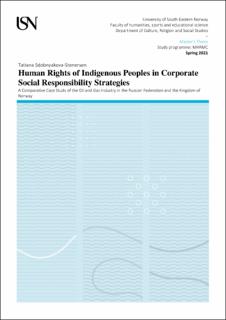| dc.description.abstract | Indigenous Peoples (IPs) of the North in Russia and Norway often meet struggles in their interactions with the oil and gas corporations operating on their lands. Indigenous communities are underrepresented in public discourse compared to energy corporations, who are the main economic driving forces in both countries. Corporate social responsibility (CSR) is supposed to be an ethical model of business interaction which requires shareholders and stakeholders to include local communities in decision-making. This thesis explores and compares the dominant discourses guiding CSR practices in Russia and Norway, specifically in terms of human rights for IPs. The study is framed using the theory of Critical Discourse Analysis (CDA), focusing on social power and hegemony. A critical epistemology also underlies this interdisciplinarity research, which uses multiple methods in addition to CDA. Historical, political and cultural analyses of Russian and Norwegian national profiles show that each country’s concepts of Indigeneity and CSR models have developed differently and, thus, have different focuses. Russian corporations follow the Soviet CSR model and are oriented around issues inside the country, while Norwegian corporations have the opposite focus. Using CDA as a tool, this research aimed at identifying the covert power and hegemony of oil and gas corporations, with particular attention to the fact that while in Russian documents, IPs are presented as powerless and vulnerable, Norwegian corporations are simply silent on any existing relationships with IPs in their reports. The findings of the study match with previous literature on CSR practices in Russia and Norway, and the relationships oil and gas corporations have with IPs of the North. In addition, it provides further theoretical and practical insights by critically indicating traces of power imbalances within the aforementioned relations.
Key words: Indigenous peoples, human rights, Corporate Social Responsibility, Critical Discourse Analysis, Arctic, oil and gas, power | |
